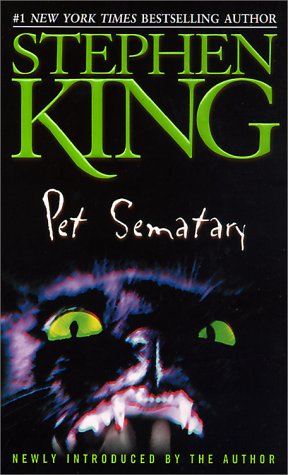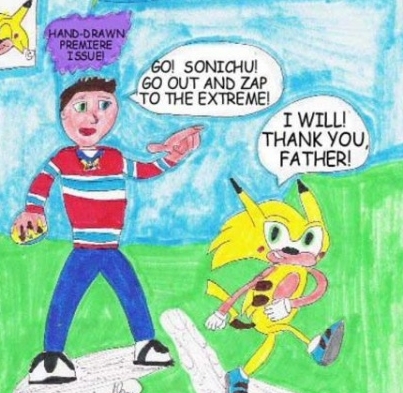 Pet Sematary is hardcore 80s King, back when he took drugs, drank like a guy in a Sheb Wooley joke (“I never drink anything stronger than pop, but my pop would drink just about anything”), and didn’t have much time for writing the Great American Novel. If you’re a fan of “literary” King, I honestly don’t know what you’re going to do with Pet Sematary. Maybe use it to line your cat’s litter box.
Pet Sematary is hardcore 80s King, back when he took drugs, drank like a guy in a Sheb Wooley joke (“I never drink anything stronger than pop, but my pop would drink just about anything”), and didn’t have much time for writing the Great American Novel. If you’re a fan of “literary” King, I honestly don’t know what you’re going to do with Pet Sematary. Maybe use it to line your cat’s litter box.
It’s another of King’s “big secret in a small town” tales, featuring scant plot but lots of scares. Louis Creed and his family move to a town that with a small cemetery for pets. Beyond the cemetary lies an old Indian burial ground. When a pet cat is killed, Louis buries it there on the advice on friendly local Jud Crandall.
The cat returns to life. Or does it? Things go bad very fast for Creed and his family. There are consequences when you stamp “RETURN TO SENDER” on the face of death, and soon both he and us are introduced to them in exhaustive detail.
King’s characterisation is always excellent. He has a talent for making characters do irrational things, while not having them seem irrational. The internal logic always holds up. At first your reaction is “what?”, then you forget your misgivings, and soon even you think you would have acted the same way. Mostly, King’s characters are just plain likeable, which makes the later events of the story heart-wrenching.
As always there’s an interesting pile of backstories that gets developed little by little. King’s main characters are always in the spotlight, but there’s the sense that there could be many more stories told about this town. It pays not to speed read, because there’s small details in characters’ backstories that tend to colour and change your perspective on their actions.
Crandall is a fascinating character. He nominally occupies the “Good Guy” seat, yet a lot of his actions are morally turbid, to say the least. There aren’t many positive sides to what he teaches Louis about the pet cemetery, and he ends up coming across like a smiling, do-gooder next door who hands a small child a gun. There is no way he couldn’t have seen what’s coming.
The book’s climax is a steady free-fall into terror, with Stephen King playing with your emotions with one hand while slashing at your guts with the other. The pace is fast, and the ending unforgettable. You can’t really go wrong with an 80s King novel, and this one continues his streak.
I don’t know whether the movie is any good.
 The book opens with an adorable anecdote about a boy going to a pet shop to adopt a dog. Oh, look. Dean Koontz is back in cute mode.
The book opens with an adorable anecdote about a boy going to a pet shop to adopt a dog. Oh, look. Dean Koontz is back in cute mode.
The first section of the book is truly horrific, detailing the quirky and hilarious life of a quirky and hilarious family who I want to murder with a chainsaw. We have a Dean Koontz Trifecta of Cute (a lovable dog, a lovable kid, and a protagonist who’s an author), huge amounts of preaching and moralising, and a general air of forced whimsy that makes getting crapped on by an elephant seem like a joy.
One scene actually made me angry. One of the protagonists says “I don’t give a flying…” realises that the aforementioned child is listening, finishes with “…furnal,” and goes off and running into this funny made-up biology lesson on the Flying Furnal species of squirrel, at which point we’re all meant to be rolling around laughing at Koontz’s livewire wit.
Well, you know what I think? Dean Koontz’s career needs to end. Once he was a storyteller. Now, he’s a self-parody. Why do you do this, Dean? This isn’t entertaining, this is awful. You’re like an annoying older relative doing “baby talk.” That’s the verdict on Relentless…300 pages of “COOCHIE COOCHIE COO.” The last few Odd Thomas books sucked, and now we get this. Dean Koontz is offically over. Close the coffin lid. Pound down the nails.
The story is about a author who writes tales of empathy and humanity, and attracts the rage of a murderous postmodern literary critic who believes such things are outdated (if you listen closely you can hear a sledgehammer sound of Koontz inserting one of his subtle metaphors). The critic has the resources of a Bond villain, and soon the author and his family are running for their lives.
That Koontz handles the story well on a certain level isn’t surprising. His led this horse around the bend many times before. It doesn’t matter, because Koontz’s nonstop clowning mixed with moralising deep-six the book.
He just has no restraint at all. There’s an embarassing scene at the end where the heroes have the main bad guy cornered and he/she/it recites a list of philosophers, roll call style, whom Dean Koontz doesn’t like. There’s no subtlety, and no attempt made to integrate it into story in a believable way. It’s just Koontz sharing his views directly at the reader through a megaphone. There are scenes of gore and violence that might have fitted in on an older Koontz title. Given the cutesy and saccharine atmosphere of Relentless, they stick out like a hand with five sore thumbs.
The book has a comic relief character called Hud Jacklight. He’s a literary agent who phones the author now and then to suggest hilariously tasteless book ideas. The Great Gatsby II, with Gatsby reborn as a vampire. White Fang II, with wolves possessed by alien mind control rays. If those books were written, they would embrace Relentless by Dean Koontz with papery arms and call it a brother. Dean Koontz is an expert on shitty books. They’re all he knows how to write these days.
 Sonichu is a comic book character created by internet legend Christian Weston Chandler.
Sonichu is a comic book character created by internet legend Christian Weston Chandler.
This debut issue contains three “Sub-Episodes” (as Chris calls them). First, we see Sonic the Hedgehog accidentally merging himself with a Pikachu, resulting in a badass new Electric Hedgehog Pokemon who zaps lightning and infringes copyrights! Next, we see Sonichu meeting the love of his life, Rosechu. The final part of the saga shows Sonichu saving Rosechu from the clutches of Naitsirhc, Christian’s evil twin.
There’s two avenues of approach to this comic. The first is as a troll or ED user looking for unintentional comedy. There’s actually not much of it here. Obviously, the art and writing are poor, but as far as atrocity tourism goes, Sonichu #0 is pretty weak stuff. There’s no bloody massacres of Chris’s online haters (Sonichu #10), no detailed images of hedgehog penises entering hedgehog vaginas (Sonichu #8), or anything of that sort, really. This comic exists at the “Extra-Mild” section of the spice rack.
The second approach is more rewarding: treat it as a journey into Chris’s mind.
I was like Chris once, drawing shitty freehand comics starring copyrighted characters for no other reason than it made me happy. I was 7 when I did that, and Chris was 23 when he did this, but I can see where he was coming from. Sometimes you’ve got to create. It doesn’t matter if your creation is worthless, or that nobody will ever want to look at it. Some things just won’t let go of you until you put them down on paper.
You can see an honest and earnest attempt here to tell a story, to entertain. There are professional comics out there that don’t give half as much of a shit. I wonder what kind of artist Chris could have been in a different life.
Love him or hate him, Chris brought an interesting flavour to the internet. Granted, it was the flavor of soiled undergarments and Axe, but it was a flavor nevertheless. By the way, I lied earlier. There is one really painful, cringe-inducing moment in Sonichu #0. Chris thought it would be a good idea to include the full text of an email to a real-life girl who snubbed him. Some Chris historian (Christorian?) should track that girl down and talk to her. I’m pretty sure any girl who has met Chris would remember the experience.
 Pet Sematary is hardcore 80s King, back when he took drugs, drank like a guy in a Sheb Wooley joke (“I never drink anything stronger than pop, but my pop would drink just about anything”), and didn’t have much time for writing the Great American Novel. If you’re a fan of “literary” King, I honestly don’t know what you’re going to do with Pet Sematary. Maybe use it to line your cat’s litter box.
Pet Sematary is hardcore 80s King, back when he took drugs, drank like a guy in a Sheb Wooley joke (“I never drink anything stronger than pop, but my pop would drink just about anything”), and didn’t have much time for writing the Great American Novel. If you’re a fan of “literary” King, I honestly don’t know what you’re going to do with Pet Sematary. Maybe use it to line your cat’s litter box.

